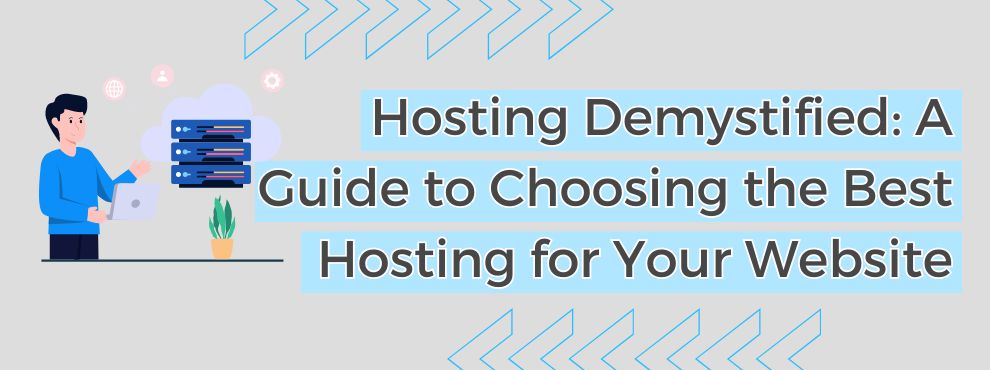In the vast digital universe, having a robust and efficient website is essential for any business. However, many website owners feel overwhelmed when trying to understand hosting, a crucial component to any online presence. This article aims to demystify hosting, explaining its basics in a simple way and providing a clear guide to choosing the best hosting for your website.
Table of contents
what is hosting?
Hosting is, in simple terms, the service that allows your website to be available on the Internet. When you create a website, all your files and data must be stored on a server. Hosting is the space on that server where those files are stored. When a user wants to visit your website, his browser requests these files from the server, which allows the website to load and be visible.
Types of hosting
To better understand hosting, it is useful to know the different types available. Below are the most common types of hosting:
Shared hosting is like living in a shared apartment. Many websites share the same resources on a single server. It is an economical option and suitable for small to medium-sized sites with moderate traffic. However, if one of the sites on the server consumes too many resources, the other sites may be affected.
VPS (Virtual Private Server) Hosting
In VPS hosting, a physical server is divided into several independent virtual servers. Each VPS has its own dedicated resources, which improves performance and stability. It’s like living in a condo: you have your own space, but you share the building with others. It’s ideal for websites that have outgrown the capabilities of shared hosting but don’t yet need a dedicated server.
Dedicated hosting
Dedicated hosting is the equivalent of having your own home. Your website has an entire server to itself, offering maximum performance and control. It is the best choice for large sites with a lot of traffic or for those who need a high level of security and customization.
Cloud hosting
Cloud hosting uses multiple servers to host your website. This offers great flexibility and scalability, as you can increase or decrease resources according to your site’s needs. It is an excellent option for sites that experience traffic fluctuations or need high availability and redundancy.

Factors to consider when choosing a hosting
Choosing the right hosting for your website depends on several factors. Here are the most important ones:
Performance and speed
The loading speed of your website is crucial for user experience and SEO. A quality hosting should offer good performance with fast load times and high uptime.
Security
Security is essential to protect your website and your users’ data. Look for hosting that offers robust security measures, such as SSL certificates, DDoS protection and regular backups.
Technical support
Good technical support can make all the difference when problems arise. Make sure your hosting provider offers 24/7 support and has a team of experts ready to help you.
Scalability
Your website can grow over time, so it’s important to choose hosting that can scale with your needs. Cloud hosting services are particularly good in this regard, as they allow you to easily adjust resources.
Price
The cost of hosting varies depending on the type and features. Make sure you have a good understanding of what each plan includes and compare prices to find the best value for your money.
Debunking common hosting myths
Myth 1: “Free hosting is good enough”
Free hosting may be tempting, but it often comes with significant limitations, such as lack of technical support, poor security and bandwidth restrictions. For a serious business, investing in quality hosting is critical.
Myth 2: “More expensive is always better”
Price is not always an indicator of quality. Some expensive hosting plans may include features you don’t need. Evaluate your needs and choose a plan that offers the best value for money.
Myth 3: “All hosting providers are the same”
Hosting providers vary widely in terms of quality, performance and support. Do your research and read reviews to find a provider that offers reliable service and good technical support.
Myth 4: “Switching hosting providers is too difficult”
Switching hosting providers may seem complicated, but many providers offer free or assisted migration services to make the process easier.
Final tips for choosing the best hosting
- Evaluate your needs: Before choosing a hosting provider, carefully evaluate your website’s needs. Consider factors such as expected traffic, the type of content you will host and your budget.
- Read reviews and comparisons: Research the opinions of other users and look for comparisons between different hosting providers. This will give you an idea of the reputation and quality of service they offer.
- Test the technical support: Before committing, test the hosting provider’s technical support. Ask a few questions to evaluate the speed and quality of their responses.
- Consider the future: Choose a hosting that can grow with your business. Make sure the provider offers scalability options so you can upgrade your plan as needed.
Conclusion
Choosing the right hosting is a crucial decision for the success of your website. By understanding the different types of hosting and considering factors such as performance, security, technical support, scalability and price, you can make an informed decision that fits your needs.
Remember that good hosting not only improves the user experience, but also contributes to the growth and sustainability of your online business. So, if you need help at IDX Innovadeluxe we have the perfect hosting for you.
start exploring your options today and take your website to the next level!
Related Posts










Deja un comentario